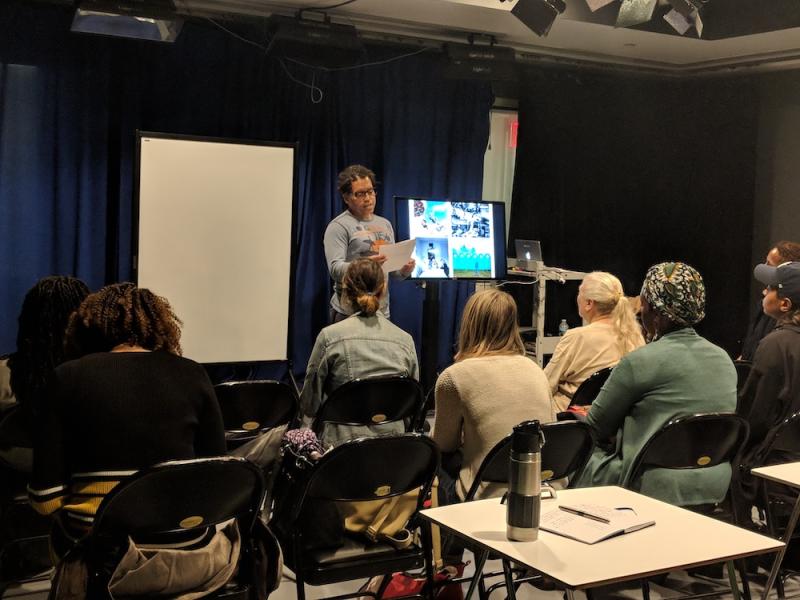NEA American Rescue Plan Grant Spotlight: African Voices

Students attend a script writing class as part of the Reel Sisters of the Diaspora film festival. This festival, which celebrates its 25th anniversary this year, is the first Academy-Qualifying Film Festival for narrative shorts devoted to women filmmakers. Photo courtesy African Voices archives
When African Voices Founder and Executive Director Carolyn Butts first learned of her organization’s selection as a National Endowment for the Arts American Rescue Plan (ARP) Grant recipient of $100,000, she was overcome.
“I couldn’t believe it. I just let the email sit and said to myself, ‘Do I really see all of those zeroes?’”
Founded in 1992, African Voices, which serves roughly 5,000 people each year, provides a platform for artists from the African diaspora to share their stories and artwork. The organization’s programming includes a subscription-based literary magazine, the African Voices Workshops and Performances series, a youth-focused Get Your Read On! program, and the Oscar-qualifying Reel Sisters of the Diaspora Film Festival, among others. African Voices has published the work of more than 4,000 writers and visual artists, many of whom have won awards and gone on to publish their work in larger outlets, including writer Amiri Baraka, renowned graffiti artist JamesTop, photographer Mel Wright and many others.
The NEA ARP funding will allow African Voices to continue serving New York City’s low-income communities by supporting staff positions. And while ARP grants are non-matching, African Voices started a grassroot community matching fund to raise $100,000 in funding to meet their plans for the future. This grant announcement came just a month after African Voices received a different NEA grant to support African Voices, their national literary magazine of the same name, for the first time. (In 2021, eligible organizations were able to apply for Grants for Arts Project (GAP) funding in addition to ARP grant funding.) Butts says receiving the $25,000 grant meant just as much because African Voices had applied for magazine funding multiple times without success.
Like many arts organizations across the country, African Voices has struggled to stay operational during the COVID-19 pandemic. The organization was forced to be innovative when putting on programs, shifting events and classes online.
“The 2020 lockdowns showed the world our artists were essential to keeping our spirits nourished and communities connected during a time when fear and anxieties were high,” said Butts. “We brought families together virtually through artistic performances, film screenings, literary readings, creative workshops and community chats. Our arts community is America’s heartbeat and conscience.”
Their successful transition to virtual platforms allowed for a bigger audience to tune into a virtual version of their annual international film festival. One benefit of going virtual for the festival was the ability to have filmmakers be a part of the conversation without the financial challenges associated with bringing all of them to New York.
“We’ve always been able to recruit films from all over the world, but online we were able to show the films and also have the directors and filmmakers there. So, you had people from South Africa speaking with people from Taiwan and everywhere in between. It was beautiful,” said Butts.
While African Voices looks forward to building a larger and more global audience, the organization is also looking to expand public access to its history. A partnership with Spelman College, a historically Black women’s college in Atlanta, Georgia is archiving all of the past issues of the literary magazine. After the process is complete, African Voices will know how many pieces of art, how many artists, and how many issues have been published. Butts says that with her small staff, tracking the publication has been challenging, but with the college’s help, and the New York Public Trust’s support, the archive will be accessible for generations to come.
Last year African Voices further emphasized its community commitment when the organization published a two-year COVID recovery plan. One key goal of the plan was to hire staff to support upcoming initiatives, something that is now a possibility thanks to the National Endowment for the Arts American Rescue Plan Grant.
“As a smaller nonprofit, we don’t often get the level of funding that can help pay for core expenses like the staff we employ. I’ve been telling people this NEA grant means I’ll be able to sleep a little bit extra,” joked Butts.
However, as African Voices kicks off its 30th anniversary celebrations in April, begins to implement a two-year COVID recovery plan, and Spelman College archives past issues of the literary magazine, it is clear Butts and African Voices are not halting in their mission to create a space for artists of color to share their work with the world.
For more information on the American Rescue Plan for the Arts, please check out our new fact sheet.





